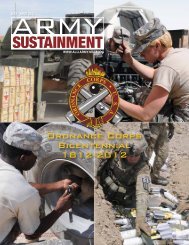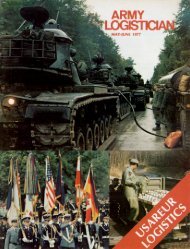Do Stryker Brigade Combat Teams Need Forward Support ...
Do Stryker Brigade Combat Teams Need Forward Support ...
Do Stryker Brigade Combat Teams Need Forward Support ...
Create successful ePaper yourself
Turn your PDF publications into a flip-book with our unique Google optimized e-Paper software.
48<br />
ALOG NEWS<br />
THIRD-PARTY TRANSPORTATION<br />
MANAGEMENT BECOMES REALITY<br />
The Defense Transportation Coordination Initiative<br />
(DTCI) began operations 31 March at Defense<br />
Distribution Depot Puget Sound, Washington. This<br />
initiative uses a third-party contractor to coordinate<br />
transportation management services among Department<br />
of Defense (DOD) organizations and commercial<br />
shippers. The DTCI contract was awarded<br />
to Menlo Worldwide Government Services, LCC, of<br />
San Mateo, California, in August 2007.<br />
DTCI is an initiative of the U.S. Transportation<br />
Command as the DOD Distribution Process<br />
Owner, in cooperation with the Defense Logistics<br />
Agency, the services, and the private transportation<br />
industry. The program uses electronic data interface<br />
transactions to process shipment requests, confirm<br />
outbound shipping details, provide shipping status,<br />
and process billing. DTCI will give DOD and its<br />
customers in-transit visibility of goods and real-time<br />
access to shipment information.<br />
DTCI will help to improve operational effectiveness,<br />
support strong small business participation,<br />
improve customer confidence, reduce the time from<br />
request to delivery for materiel, enable improvements<br />
in business practices, and protect operational capabilities,<br />
such as DOD critical infrastructure assets.<br />
The use of a third-party coordinator will allow DOD<br />
to secure on-time, cross-platform and cost-effective<br />
shipping options for materiel moving within the continental<br />
United States.<br />
DOD will exclude some items from the program,<br />
including sensitive and classified shipments, arms,<br />
ammunition, explosives, bulk and missile fuels,<br />
household goods, and privately owned vehicles.<br />
LOGISTICS LEADERS CHANGE<br />
The commanding general of the Army Combined<br />
Arms <strong>Support</strong> Command (CASCOM) at Fort Lee,<br />
Virginia, Major General Mitchell H. Stevenson,<br />
was promoted to lieutenant general and assumed<br />
the position of Deputy Chief of Staff, G–4, Department<br />
of the Army, in June. He replaced Lieutenant<br />
General Ann E. Dunwoody, who became the deputy<br />
commanding general and chief of staff of the Army<br />
Materiel Command. General Stevenson is a former<br />
Chief of Ordnance and commanding general of the<br />
Army Ordnance Center and Schools.<br />
The new CASCOM commanding general is Major<br />
General James E. Chambers. General Chambers was<br />
the Chief of Transportation and commanding general<br />
and commandant of the Army Transportation Center<br />
and School at Fort Eustis, Virginia.<br />
HET UPGRADE BENEFITS VEHICLE RECOVERY<br />
Oshkosh Defense has secured a contract to<br />
upgrade the Army’s M1070 heavy equipment transporter<br />
(HET) with new technology and greater loadbearing<br />
capability.<br />
The M1070A1 HET will be the first palletized<br />
load system recovery vehicle with the capability and<br />
payload capacity to recover heavy armored vehicles<br />
like the mine resistant ambush protected (MRAP)<br />
and <strong>Stryker</strong> vehicles. It will also be capable of<br />
uprighting vehicles, recovering vehicles on steep<br />
slopes, and pulling vehicles stuck in water, mud,<br />
sand, or snow. Use of the new HET will reduce<br />
wear and tear on recovered equipment by using<br />
flat towing, which places less pressure on vehicle<br />
axles and chassis during pulling. Improvements<br />
to the power train, including the engine, transmission,<br />
transfer case, and electrical systems, will also<br />
be part of the project. The new HET will feature<br />
improved axles, wheels, seats, a new hood, dash<br />
panel, airconditioning, and additional support for<br />
future armor upgrades.<br />
Under the $11.333 million contract, Oshkosh will<br />
deliver six pilot vehicles for testing by January 2009.<br />
ARMY LOGISTICS MANAGEMENT COLLEGE<br />
ALEDC COURSE IS CHANGING TO ATLog<br />
Students currently enrolled in the Army Logistics<br />
Management College’s (ALMC’s) Associate Logistics<br />
Executive Development Course (ALEDC) have<br />
until December 2008 to complete all five phases of<br />
the current program before ALEDC becomes the<br />
Associate Theater Logistics (ATLog) Course. The<br />
ATLog Course will kick off with a pilot course in<br />
October before the full program is implemented in<br />
December.<br />
Like ALEDC, the ATLog Course will include<br />
five phases that will have to be taken in order.<br />
Phase 1 is a 2-week resident phase at Fort Lee, Virginia,<br />
on theater logistics. Phases 2 through 4 will<br />
be online courses on data analysis and application,<br />
JULY–AUGUST 2008







